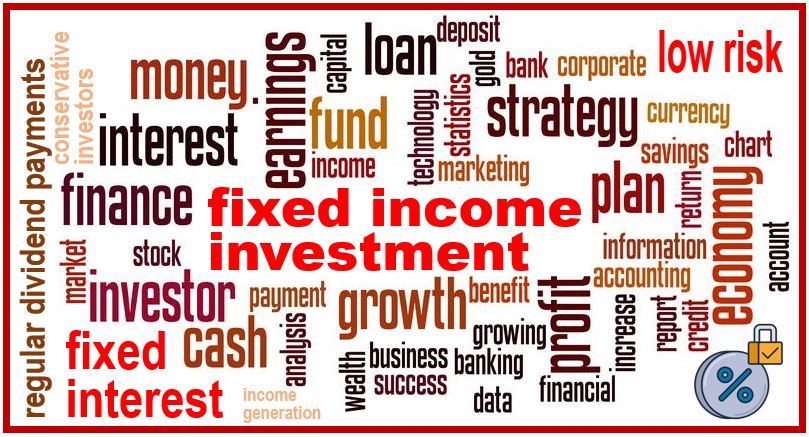Let us first get the view of fixed income investing. Broadly it refers to those types of investment securities that pay investors fixed interest or dividend payments until maturity. At maturity, investors get repaid the principal amount that they had invested. Unlike equities, which may give cash or no cash to investors of variable income securities, and where payments can change based on some underlying measures.

There are companies and governments issuing securities to raise money to fund day-to-day operations and Finance large projects that they undertake. For an investor, fixed income instruments can be a set of interest sums in exchange for investors lending them money. At maturity, investors are repaid the original amount that they had invested, known as the principal amount.
For Example:
A company may issue 5% interest with 1000 rupees face value in 5 years. An investor who buys the bond for 1000 rupees and will not be paid back until the end of the five years has been completed. And for the five years, the company pays interest amounts called coupon payments based on the rate of 5% per year. As a result, the investor is paid 50 rupees for 5. At the end of 5 years, the investor is repaid the whole 1000 rupees that he had invested initially. The investor will also find fixed-income investments that pay coupon payments monthly, quarterly, or semi-annually.
Who Should Invest in Fixed Income Securities?
These fixed-income securities are recommended for conservative investors who seek to diversify the portfolio. The percentage of the portfolio dedicated to fixed income depends on the investor’s investment method. There is also an opportunity to diversify the portfolio with the mix of fixed income products and stocks that create a Portfolio that might have 50% in fixed and 50% in stocks.
As an investor investing in fixed income, what are the potential benefits you would receive?
Potential Benefits
-
Diversified stock market today
Fixed income is broadly defined to carry lower risk than stocks do. It is because fixed-income assets are generally less sensitive to economic risks such as economic downturns and geopolitical events. So, if you are an investor who is seeking to grow your wealth in investments over time or to save for retirement you probably hold a significant amount of stocks in a Portfolio. But allocating a portion of your portfolio to fixed income can potentially help set losses when stock markets swing.
-
Capital preservation
It means protecting the absolute value of your investment via assets that have a stated objective of return of principal. An investor who is already close to retirement may rely on the investments to provide income because fixed income is typically carrying less and can be a good choice of assets for investors who have less time to recoup their losses. Apart from all this, you should still be mindful of inflation risk, which can cause your investment to lose value over time.
-
Income generation
Fixed income funds can help you generate a steady source of income. As an investor, you would receive a fixed amount of income at regular intervals in the form of coupon payments on the bond holding. And in the case of money, Municipal bonds income is exempt from taxes.
-
Total return
Some of the fixed-income assets have the potential to generate attractive returns over time. An investor seeks for higher return by assuming more credit risk or interest rate risk, in order, the end product becomes the capital along with the interest earned.
Strategies to meet your financial goals through fixed-income investments
Optimize your Portfolio Returns – When you hold on to fixed-income investments over a while, you can ride out the market’s ups and downs.
Utilize the Barbell Investment Method
Use a barbell strategy; it entails investing at the short and long ends of the yield curve. When rates begin to drop, the long end gives a potential for capital gain.
The Matched Asset Program
This is when you can match high-risk investments like equities, mutual funds, etc, with treasury zero-coupon bonds that guarantee a portion of the return of the original investment.
Buy Discount Bond Investments
Buying lower coupon bonds at a discounted par value can offer various advantages.
Get Premium Bond Investments
They are the bonds that are above their par value, but they offer higher yields than non-callable bonds.
Analysis of the Risk and Reward Ratio
You need to make purchases according to the shape of the curve, for which you need to analyze the risk and the reward between purchasing different maturity bonds.
Associated Risks
Every coin has two sides, so does a fixed-income fund. There are certain risks associated with fixed income, and they are mentioned here below.
-
Interest rate risk
When interest rates rise the bond prices fall, meaning the bond you hold loses value. Interest rate movements are the major cause of price volatility in the bond market.
-
Inflation risk
Inflation is another major source of risk for all the bond investors in the market. A bond provides a fixed amount of income at regular intervals, but if the rate of inflation outpaces this fixed amount of income, the investor would lose purchasing power.
-
Credit risk
For instance, if you are an investor in corporate bonds, you take on credit risk in addition to interest rate risk. Credit risk, which is also known as business risk, is the possibility that an issuer could default on its debt obligation. If this happens an investor may not receive the full value of the principal invested.
-
Liquidity risk
Liquidity risk is a chance that investors might want to sell a fixed income as it but they are unable to find the potential buyer.
How is a fixed income fund different from a floating rate fund?
Floating fund
A floating rate fund is a fund that lets investors invest in financial instruments that pay a variable or floating interest rate or a floating interest rate fund that invests in bonds and debt instruments where payments fluctuate with an underlying interest rate. So the interest rate an investor receives would depend on how the fund performs in the market, for instance, you can consider HDFC Floater Fund.
Fixed income fund
Fixed income funds are a class of assets and securities that payout levels of cash flow to investors, typically in the form of fixed interest or dividend at maturity.
Eg: SBI Magnum Income Fund.
Though both of these funds give out interest, one remains constant whereas, the other varies based on the market performance. In this case, an investor with a low-risk appetite might choose a fixed income fund over a floating rate fund.
Conclusion
Fixed income funds have a higher claim to the assets in bankruptcy and the government. You can always manage the environmental risks that come along with this fund with the proper strategies as they are highly moderate. The investment market comes with great boons side by side with minute risks. With a fixed income fund, it is a great way to balance out your portfolio keeping your gains higher than your losses.
Interesting related article: “What does Risk Averse mean?“
------------------------------------
By: Christian Nordqvist
Title: What is Fixed Income Investing?
Sourced From: marketbusinessnews.com/what-is-fixed-income-investing/273270/
Published Date: Mon, 16 Aug 2021 21:45:24 +0000






